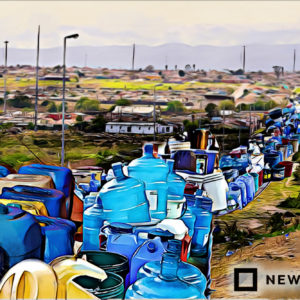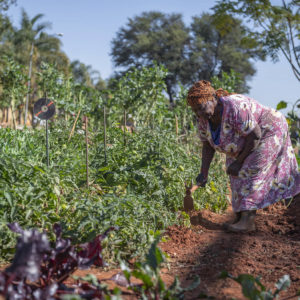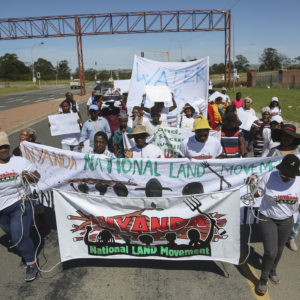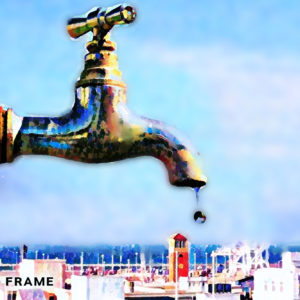Behind Day Zero is a metro that has failed to care
When the taps run dry in the Nelson Mandela Bay municipality, it will be the failures of the political class that plunge more than one million residents into disaster.
Author:
24 June 2022

Nelson Mandela Bay’s Day Zero, expected to arrive next week, provides a terrifying glimpse for the rest of South Africa of what might occur when climate change events such as drought intersect with the accumulated weight of colonialism and apartheid, and nearly three decades of austerity and corruption.
The leadership of the Eastern Cape metro has alternated several times between the ANC, the DA and coalitions led by these two parties since 2016. But a common thread has been the contempt with which all of them have held working-class and impoverished communities, and the sharp contrast in the value they have assigned to historically white suburbs.
The four main causes of the imminent Day Zero are austerity, corruption, the dereliction of duty to fix water leaks and the failure by the municipality to curb the overuse of water by elites and corporates.
As far back as 1997, municipalities placed under austerity measures by the government’s growth, employment and redistribution macroeconomic policy cut back on maintenance budgets and implemented a freeze on hiring municipal workers in the hope of privatising as many municipal services as possible.
Related article:
Plumbers, builders and other workers with valuable technical skills were allowed to retire without being replaced. The decade of corruption that followed under Jacob Zuma saw public funds for infrastructure development and maintenance disappearing into the pockets of individuals through crude and elaborate money-laundering schemes, such as the establishment of ghost worker cohorts, and the awarding of grossly inflated tenders.
The failure to challenge the logic of apartheid spatial planning means that services in suburbs continued to be maintained at the expense of services in townships, which were allowed to deteriorate, and in shack settlements, which were never properly established.
The Nelson Mandela Bay metro’s 1.2 million residents, who live in the cities of Gqeberha and Kariega and the surrounding small towns of Despatch and Colchester, use 285 million litres of water a day. Since 31 March, the metro has been able to source 190 million litres of this water from the Free State’s massive Gariep Dam, about 400km away, as part of the Nooitgedacht water scheme. This leaves a shortfall of 81 million litres of water a day. Twenty eight percent of water is lost through more than 3 100 leaks and another 70 million litres are unnecessarily wasted through overuse.
Too little, too late
The municipality now claims to be racing against time to fix the thousands of leaks by next week – an impossible task. But the Democratic Municipal and Allied Workers Union of South Africa (Demawusa), which is affiliated to the South African Federation of Trade Unions, proposed this leak repair programme four years ago when the previous drought raged.
A full sitting of the council even agreed in December 2018 to insource 106 temporary plumbers or leak technicians, who at the time were making great progress in repairing leaks in households that qualified for the city’s assistance to the poor subsidy.
But the National Treasury stepped in, deeming the insourcing to be “unfunded” and saying it should not take place. According to Demawusa, after a brief stint on “slavery wages” in the expanded public works programme (EPWP), the plumbers were then laid off in 2020, which meant that millions of litres of treated drinking water have continued to leak from aged and faulty pipes ever since. The money wasted by this austerity decision undoubtedly runs to millions of rands more than it would have cost to insource the valuable leak technicians, who sat at home, unemployed for two years.
Related article:
Demawusa regional secretary Thabo Chochoe says his union even told the municipality several months ago that the plumbers were willing to return on EPWP wages for 2022 to fix the leaks and stave off Day Zero. The municipality ignored the union and only hired the plumbers back on 1 June, on one-month contracts, which is far too late to fix the thousands of leaks before the dams run out of water.
The Nelson Mandela Bay municipality is known to be particularly corrupt and its dereliction of duty during the water crisis cannot be solely blamed on the National Treasury. In 2015, former government official Crispian “Chippy” Olver was deployed to the municipality for 19 months to clean up corruption, but he eventually left in fear of losing his life.
He later wrote How to Steal a City, documenting how the then ANC regional secretary, Zandisile Qupe, and businessperson Fareed Fakir ran a mafia milking the municipality of its funds. The chief whip, mayor, a number of ANC councillors, city manager and directors in most departments, including corporate services, supply chain, legal services and finance, all fell under their control in a criminal syndicate.
Ignoring the people
Apart from being deeply corrupt and contemptuous of progressive unions such as Demawusa, the council has also repeatedly ignored local coalitions of community groups, land rights organisations, women’s groups and urban agriculture practitioners, who have long demanded that the municipality set up inexpensive water-harvesting systems at schools and clinics to carry people through in times of drought.
Now formed into a water crisis committee, these groups have made broad demands for “water justice” that are helpful but have again been ignored by the municipality. The committee wants one water tank attached to each house, an end to corruption in the municipality, a municipal budget for repairs and maintenance of the water system – which should be self-evident – and for residents to be taught to recycle grey water.
While it has not rained enough to replenish the dams, better-off residents who have bought water storage tanks say they have been able to store about 2 500 litres of rainwater, which will carry them through the first three weeks of the Day Zero era. Had the municipality installed water tanks at every home during the last drought and fixed the leaks, Day Zero would not be happening.
Related article:
At the very least, the organisation Gift of the Givers, which has been forced to come to the metro’s rescue, would be able to finish drilling as many boreholes as possible by next week in the hope of connecting to the water reticulation system so that some water still flows from taps. There are now dire but appropriate warnings from Gift of the Givers of a major health crisis and fire hazard that will occur when the taps eventually run dry.
The spectre also looms of a city brought to a standstill by hundreds of thousands of people lining up for water at trucks and taps all day, every day, carrying containers ranging from 25-litre buckets to two-litre cooldrink bottles.
Abusing goodwill
The municipality now relies on strong, historical ubuntu-centric traditions in the Eastern Cape – revived and reinforced by the care and support that Black working-class people showed each other during the Covid-19 lockdowns – to carry these communities through Day Zero.
However, ubuntu is also cynically being abused, with the municipality cutting off services to townships and shack settlements in the knowledge that those communities will come together to access water. For example, in the Riemvasmaak shack settlement of 500 people, water that is already provided by just five working taps has recently been disconnected for up to eight days at a time.
In parts of the built-up KwaNobuhle township, water has been completely cut off for the past two months. It is common in these areas to see unemployed people and pensioners lining up for hours to collect buckets of water and push these home in wheelbarrows, assisting those who still have jobs. When the truck runs dry, some people walk the streets for hours each day looking for alternative sources of water, which they later share with neighbours, no matter how scarce.
Related article:
The few individuals whose taps, for unknown reasons, were not disconnected are readily running up water bills of tens of thousands of rands by letting their neighbours fill buckets at their homes, sometimes throughout the night. They are doing this on the basis of a verbal promise from the ANC ward councillor that they will not have to pay the bill because it is a crisis situation.
In the suburbs, on the other hand, the municipality has not disconnected people, or even imposed restrictive devices. The result is that many residents continue to waste water unnecessarily, hastening the arrival of Day Zero for those who are already forced to survive on just a few litres a day.
Photo opportunities for which Minister of Water and Sanitation Senzo Mchunu has been flown in to stand next to a near-empty dam flanked by sombre-looking municipal officials are cynical spin. Day Zero is not an unpredictable and unavoidable natural disaster. It is a political failure.




